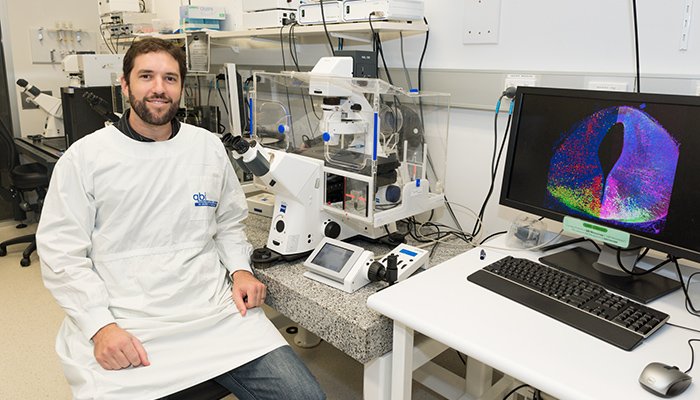Podcast: treating schizophrenia, bridging the divide between lab and clinic

Despite affecting more than 21 million people worldwide, schizophrenia is one of the most misunderstood disorders in the broader community, and one of the most puzzling for neuroscientists. QBI’s Dr James Kesby recently received a $300,000 Advance Queensland Research Fellowship to research how the disorder develops, but also to bridge the divide between the laboratory and the clinic.
Transcript
[MUSIC]
Kirsten MacGregor
Hi, I’m Kirsten MacGregor, and you’re listening to A Grey Matter, the neuroscience podcast from the Queensland Brain Institute. In a calendar full of awareness weeks and days, the need for a schizophrenia awareness week remains paramount. Despite affecting more than 21 million people worldwide, schizophrenia is one of the most misunderstood disorders in the broader community, and one of the most puzzling for neuroscientists. QBI’s Dr James Kesby recently received a $300,000 Advance Queensland Research Fellowship to advance his own research into the development of the disorder, and also to bridge the divide between the lab, and the clinic.
Dr James Kesby
Schizophrenia is a complex neuropsychiatric disorder. The ratifications of the disorder are manyfold, with diverse symptoms, the one that most people recognise is the psychotic symptoms, which we classify as positive symptoms. That’s the thought delusions, the sort of detachment from reality, paranoia, that type of effect, which is obviously a key part of the disease, and is one of the major points that results in diagnosis. And, for the most part, we can treat psychotic symptoms.
But there are two other groups of symptoms – the cognitive symptoms, which are memory, learning, ability to take in complex patterns and come out with outcomes that work to your advantage, and also the negative symptoms, which are I suppose a blunted emotional affect, reward alterations, so your ability to look back on previously positive events and reflect on them the same way a normal person would. And these are two symptom groups we can’t treat currently with the existing medications, and they tend to be some of the more debilitating aspects of the disease.
Kirsten MacGregor
There seems to be this persistent notion in the broader community of a split personality, and in fact it’s a pretty lazy insult, in that context, and that’s completely wrong?
Dr James Kesby
So, the split personality comes from a very, very early diagnosis of schizophrenia, way back where it was a fractured mind, and I suppose that is all related to the psychotic-type events, where in a psychotic state, obviously these types of thoughts and delusions are more prevalent. But in terms of schizophrenia the disorder, the psychosis is only one part of the package, and as I said, we can treat most individuals that can be treated to some extent. But there’s a lot of other things going on that affect daily functioning, and a lot of that comes down to the cognitive and the negative things, which you may not be able to tell from one person to the next in the general public, but you’ll see in the population level that they’re less successful, have more trouble doing things that most people do and take for granted.
Kirsten MacGregor
So how common is it?
Dr James Kesby
The general statistic that’s thrown out is about 1 in 100, but that’s not equal amongst everybody. So there’s genetic risk, which is probably the strongest risk you can have, if you have someone very close in your family who has schizophrenia, you’re much more likely to be at risk of developing schizophrenia. There’s also a lot of environmental factors – when you’re born, if it’s winter/spring vs summer.
Kirsten MacGregor
Are you kidding me?
Dr James Kesby
Yeah, it’s a seasonal effect, it’s been known for a long time, the epidemiology is very strong, and that seasonal effect seems to get weaker towards the equator, where there’s less seasonal patterns. So epidemiology is what leads us to think of new targets to test, to see if they’re risk factors, and that’s what John McGrath works on, the vitamin D, and Darryl Eyles, that develop mentally if you’re born in winter/spring, you might have lower levels of vitamin D, because your mother didn’t get as much sun. And obviously infection, those types of things that follow the cold months. There are all these key points in development, which I suppose emphasises that schizophrenia isn’t a disorder that you just ‘get’, at 15-25 years of age, it’s a progressive thing that’s sort of the psychosis that kicks in then, but there’s a lot of evidence to suggest there’s a trajectory that starts a lot earlier than that.
Kirsten MacGregor
You mentioned though that treatments really aren’t that effective at the moment.
Dr James Kesby
They’re effective in most people at blunting or stopping psychotic episodes. There’s about 30% of non-treatment resistant patients, and some certain treatments are more beneficial to those than others, but for the most part, it really only works for positive symptoms.
There’s been some huge studies that have looked at whether anti-psychotic treatments, which primarily block the dopaminergic system, which is featured in psychosis, help cognitive or negative symptoms, and pretty much they don’t. And any psychotics have been around for 50 years all focus on the same sort of receptor systems, the side effects profiles have gotten better, and they may be able to work better in certain sub-populations for the psychotic episodes, but we’re really treating one-third of the disease, and potentially not the main game either.
Kirsten MacGregor
So where’s the most pressing need then for research?
Dr James Kesby
Well, where to start, I suppose. I guess there’s a few different avenues – one, we’re still trying to figure out what exactly is going on in schizophrenia. You’ll commonly hear it called a diverse group of brain problems, and that’s partly because the heterogeneity of the symptoms, which means not everyone shows the same symptom profile – one person to the next with schizophrenia could have a whole different range of cognitive, negative symptoms, so there’s not one feature you can grab and hold onto and say, ‘schizophrenia’. The diagnostic criteria heavily rely on the period of psychosis, which, as I’ve said, is not necessarily the primary feature of the disease, but we need something to diagnose these individuals, and has to be lengthy, so by the time we’ve even diagnosed someone with schizophrenia, they’ve been going through problems for quite some time. So we’ve got focus on what is actually happening at the time of psychotic onset, what is schizophrenia, how’s it being caused at that point, and also, what’s leading up to that prior to that, and then very early, which is the genetic work that’s going into it and the epidemiology of neurodevelopment, what’s happening so far back that might lead to this ultra-trajectory development.
Kirsten MacGregor
Because your own work really focuses on the dopamine system?
Dr James Kesby
Yeah, so, there’s arguments for and against the dopamine system being one neurotransmitter, it is heavily involved in psychosis. But obviously anti-psychotics don’t block these other features, so is dopamine involved in those behaviours? Maybe not, at the time of onset, but our thoughts are, well, perhaps the dopamine system has been altered for a long time, and there is evidence for people who are high-risk who develop schizophrenia later to show that altered dopamine response is already present.
Kirsten MacGregor
And we should specify that that’s a chemical in the brain.
Dr James Kesby
Yeah, dopamine is a chemical in the brain, most likely you’d know it form reward, it makes you feel good when good things happen, so drugs of abuse that make you feel good, they stimulate dopamine, Parkinson’s is a degenerative disorder of dopamine neurons, so it’s also involved in motor function. It’s a very key neurotransmitter, but obviously in the complex brain, everything works in systems, so dopamine feeds into one region, and then that feeds into other brain regions, doing different functions via other neurotransmitter systems.
So I suppose there’s two arguments to what’s happening prior to schizophrenia, and our argument is perhaps dopamine development has been altered, and that leads to this at-risk brain, and then all the other factors throughout life end up making the system that has these negative-positive and cognitive symptoms, and we can only stop dopamine and stop the psychosis at that point.
The other argument is that maybe other neurotransmitters are altered in other systems, and this leads to this dopaminergic system later down the stream. They’re both very valid hypotheses, but we need to keep testing and looking and we’ve decided that maybe dopamine might be the key for us, given some of the work that’s out there and the literature.
Kirsten MacGregor
And you’ve just received a $300,00 Advance Queensland Research Fellowship from the Queensland Government, what will you specifically be using that for?
Dr James Kesby
Yeah, I was quite fortunate to receive this. So basically the idea is to partner up basic researchers like myself with industry partners, in this case I’ll be working with the Queensland Centre for Mental Health Research, and particularly associate professor James Scott who’s a clinical researcher, he’s a psychiatrist.
So, my goal with this fellowship is to try to create better communication between basic and clinical research. Because with all these complicated things, you can get kind of blinkered, looking in the one direction; your focus on your work, or the researcher’s related to you work, and then the clinicians are treating patients, so they have these different perspective on these disorders, because each patient is a case study in a sense; each patient has to be treated on their background, and all these other things, which is how they have to work.
But we need better communication so that when I find something that in basic research that might lead to an idea, then the clinicians can take that into account and see if it pops up in their working environment and vice versa, they can say they’ve been seeing this tendency towards maybe these things having an influence on our patients, let’s go have a look and see whether or not on a basic level that makes sense with what we know. And you need to, you can’t just have a meeting once a month, to do these things – you need to be ingrained in each other’s research streams, and the aim of this fellowships is to do that.
So I’m going to be involved in some of the clinical work that’s going on, particularly the South-East Queensland Psychosis Platform at James Scott’s building, and that is to look at first episode and high risk subjects that come into the clinic, and they’re going to have a whole bunch of different cognitive tests, and blood samples taken to try and figure out what’s going on at this stage, and can we intervene at this stage and have a better outcome for these patients. So, being integrated in that clinical work is going to lead me to have ideas that maybe we can have a look at on a basic level, and vice versa, some of the work I’m doing might lead to outcomes we can put in places in different tests to see if that pans out in the clinic.
Kirsten McGregor
What’s the dream for schizophrenia research? Is a cure possible, is it prevention, is it a better treatment, or is better diagnosis the best we can hope for?
Dr James Kesby
Well, a little from all the columns there, obviously, but the dream would be to prevent schizophrenia. Obviously there’s genetic components, so you might not ever be able to fully prevent it, like a lot of the general population has psychotic experiences, so it’s not, you know, just schizophrenia.
But I think the aim would be to find intervention strategies that can certainty minimise the outcome of this disorder. Better treatments are a start, because we cannot catch everyone who is at risk, so better treatments to deal with these cognitive and negative outcomes. Better intervention strategies earlier, there’s a lot of work going into that in Australia, Pat McGorry has been charging that for a long time. Obviously that comes with ethical dilemmas – who is going to get schizophrenia, and do you want to label them with schizophrenia that early, and how do you find these people and then help them out at the right stage. And that is an ongoing battle, because of the complexity of schizophrenia, it’s got a lot of symptoms that overlap a lot of disorders.
Kirsten MacGregor
So how is QBI, the Queensland Brain Institute, positioned on all these fronts?
Dr James Kesby
Well, frankly, I came back from the United States to work here, because it’s positioned so well with what the basic work that Darryl Eyles, Tom Burn, John McGrath are doing here, the epidemiology that John McGrath is working on, the clinical trials and then partnering with the Queensland Centre for Mental Health.
And then there’s other people in the building who use a lot different techniques that can be applied in a myriad of ways that without being, again, in close proximity, having more than one meeting and having a chat, being integrated you can achieve a lot more, and get a lot more expertise at hand than many other institutes.
Kirsten MacGregor
James, thank you and good luck.
Dr James Kesby.
Thanks a lot.
[MUSIC]
Kirsten MacGregor
That’s Dr James Kesby. I’m Kirsten MacGregor, and that’s all for this episode. If you’d like to know more about schizophrenia, you can listen to another pod cast in our series with QBI’s professor John McGrath. He’s a psychiatrist investigating the links to marijuana, smoking, and vitamin D. You can find us on Twitter, and on Facebook, or you could give us a review on iTunes. Thanks for listening.
Presented by Kirsten MacGregor. Produced and edited by Donna Lu.
A Grey Matter is the Queensland Brain Institute's podcast about neuroscience. It features music from Incompetech, available under a Creative Commons Attribution-Noncommercial license.
Music used:
‘There It Is’ by Kevin McLeod – bit.ly/1nW96tY


